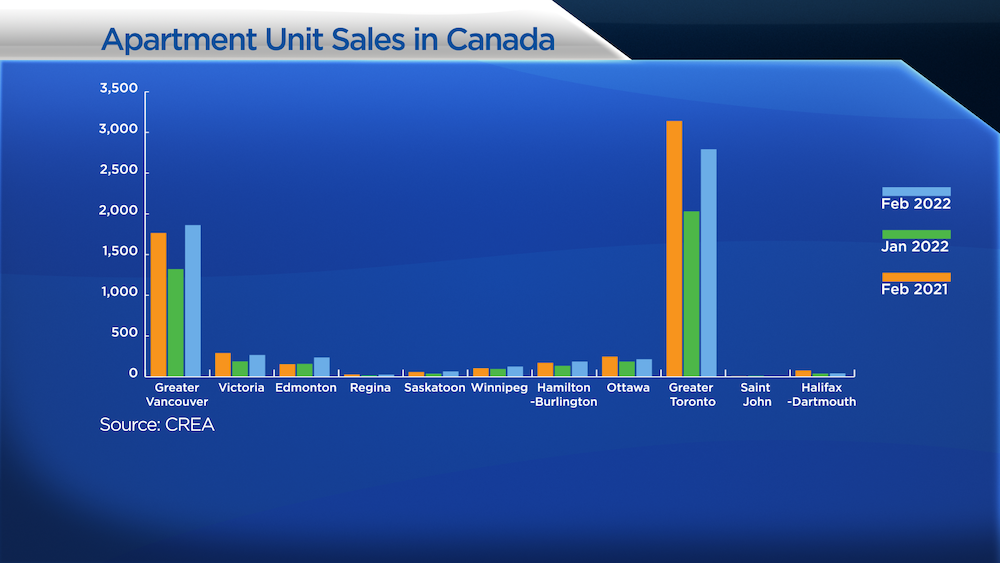The gradual recession of the COVID-19 pandemic could see demand for condos in Canada’s big cities hold strong in 2022, real estate experts say, even as rising interest rates may have an overall dampening effect on the country’s housing market.

On Tuesday, the Canadian Real Estate Association (CREA) released national sales figures for February, showing month-to-month growth in the number of units sold from January but an overall decline of eight per cent from the same month a year earlier.
While overall transactions dipped year-over-year in Canada, apartment-style units in major markets largely saw an uptick in sales last month compared to February 2021, according to figures CREA prepared for Global News.
Greater Vancouver, Edmonton, Winnipeg and Hamilton-Burlington all saw apartment sales jump both year-to-year and month-to-month.
Though the Greater Toronto Area saw a modest year-over-year decline in this segment, apartment unit sales in the region jumped 38 per cent month to month.
Realtor Tom Storey with Royal LePage in Toronto tells Global News that he hasn’t seen demand for condos this high since 2017, and that the first few months of the year have aligned with his assessment that 2022 could be the “year of the condo.”
Condos ready for a post-pandemic return
The onset of the COVID-19 pandemic in 2020 saw many condo dwellers leave the city in search of more space and affordable real estate, as work-from-home lifestyles became the norm for white-collar jobs.
Rob Kavcic, senior economist at BMO Capital Markets, tells Global News that the condo market, while never reversing in value, saw growth “stagnate” compared to single- and semi-detached property classes over much of the pandemic.

He says the past six to 12 months have seen activity picking back up, however, especially in areas such as Toronto and Vancouver.
“There is a shift in demand back into the big cities,” Kavcic says.
Storey says that, two years ago, Royal LePage was fielding calls from condo owners looking to sell their Toronto units in exchange for more space in an adjacent market in southern Ontario such as Guelph or Kitchener.
Now, as public health measures surrounding the COVID-19 pandemic drop and companies start to call workers back to the office, demand is switching back to downtown Toronto.
Those same sellers from the early days of the pandemic are having second thoughts, Storey says.
“They’re calling us and being like, ‘Hey, what does it cost to rent a place in Toronto? Because we might have to commute a few days a week.’”
Storey says that in many cases, however, these quick sellers are not in poor financial positions to move back into Toronto’s hot housing market.
Because condos saw less price appreciation than their residential-class counterparts, those who bought single-detached homes outside the GTA are finding the value of their homes outpaced condos in Toronto. That puts them in a strong position to put their money back into a Toronto condo, he says, if they want to move back to the big city.
Storey isn’t convinced the shift back will be in the same magnitude as the original exodus, as some people might have grown accustomed to the extra space and have jobs that continue to enable hybrid work arrangements.
But there is one pain point he’s hearing from clients that might prove to be a tipping point for those considering a move back to Toronto: soaring gas prices.
“If you’re going to have to sit in your car for an hour and a half each way (on the commute), plus gas prices and everything else, you might reconsider.”

Condos most insulated against rising interest rates
The Bank of Canada moved to start hiking its overnight interest target earlier this month, with signals for additional increases throughout the year.
Kavcic, who predicts three or four more interest rate hikes in 2022, says he’s already noticed a change in “sentiment” among real estate buyers and investors. He believes some have already started easing off the Canadian housing market in response to even the initial 25-basis-point increase at the start of March.
Jamie Squires, president of Fifth Avenue Real Estate Marketing in British Columbia, says she’s already noticed a slowdown in sales in the Fraser Valley this year. It started with single-detached homes in January, and moved down into townhomes in February.
- Posters promoting ‘Steal From Loblaws Day’ are circulating. How did we get here?
- Canadian food banks are on the brink: ‘This is not a sustainable situation’
- Is home ownership only for the rich now? 80% say yes in new poll
- Investing tax refunds is low priority for Canadians amid high cost of living: poll
This “trickle-down” effect could see condo sales slow in the months to come as well, she tells Global News.
But even as demand slows across all property classes, Kavcic says rising interest rates will hit the condo market last, as it will remain the most affordable option for aspiring homebuyers looking to get into the market before they’re fully priced out.
“A lot of first-time buyers and younger families are forced to move down the price ladder and eventually that flows into semis, towns and condos,” he says.
Kavcic believes condo properties in smaller Canadian markets might be more exposed to a downturn stemming from rising interest rates, but thinks bigger markets will remain relatively insulated.
He cautions that condos won’t be “totally safe” should the sector see a sharp correction in the future. But Kavcic notes that since that market didn’t see the rapid price growth that other property classes did during the pandemic, condos don’t have as far to fall as interest rates rise and attempt to cool Canada’s hot housing market.
“There’s less froth to clean up there.”






Comments